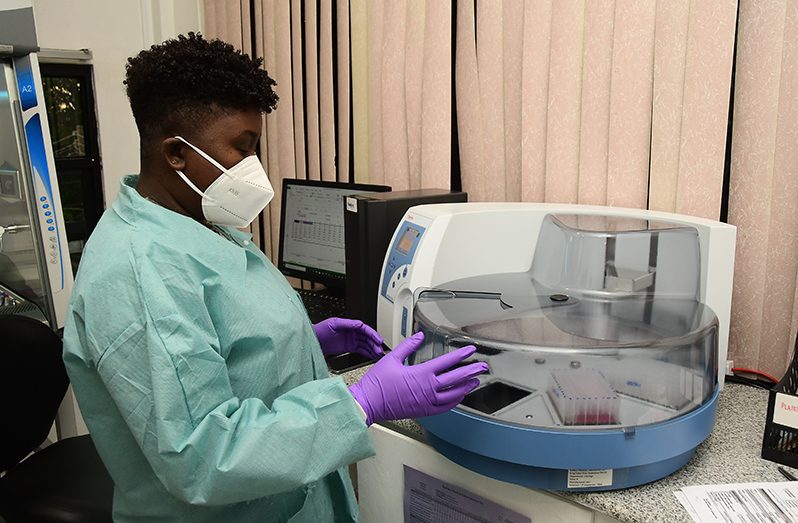-‘Lab’commits to cooperating with authorities; CARPHA can analyse 10 samples per month
By Vishani Ragobeer
FOLLOWING reports that the Eureka Medical Laboratories Inc. discovered what appears to be an ‘abnormal’ makeup of COVID-19, which could possibly be a new strain of the virus, the Health Ministry has requested those test results from the private establishment for further examination.
Responding to a question from the Guyana Chronicle during his daily update with the Department of Public Information (DPI), Minister of Health Dr. Frank Anthony maintained that Guyana does not have the capacity to conduct the genetic sequencing necessary to identify the various strains of COVID-19.
But, he highlighted, “As it is, we have not received any such report from Eureka Medical Laboratories, and I have asked the Chief Medical Officer to write to Eureka for the results for what they purportedly have of these new strains that they have discovered in Guyana.”
He noted that no such report has been received as yet, but the Ministry will await to see whether the establishment will provide those.
On Monday, Director of the Eureka Medical Laboratories, Dr. Karen Gordon-Boyle confirmed that the Ministry requested the samples that Eureka has stated consisted of those abnormalities. It was her understanding that these samples would be sent to Caribbean Public Health Agency (CARPHA) for further analysis which would confirm whether these abnormalities are the new strain(s) of COVID-19.
“We will certainly be cooperating because we would also like to know,” Dr. Gordon-Boyle said, adding later, “If the ministry sets up the protocols with CARPHA, and we see any such cases and we want to find out and the ministry is interested in finding out if it is a particular type of COVID, we will automatically make those samples available for the ministry to send wherever we want to send it.”
She affirmed that the laboratory does not have the capability to perform any genetic sequencing, but she contended that based on the testing mechanism the laboratory employs, it can detect when there is some abnormality.
During his update, the Health Minister also highlighted, “I know, as a matter of fact, that Eureka Medical Laboratories does not have the capabilities of doing the genetic sequencing of the virus, and since they don’t have that capability, whatever they’re doing, they might be making inferences.”
NOT GOOD ENOUGH
The minister stressed that making inferences is “not good enough in this particular instance”.
Last week, during an interview with the Guyana Chronicle, Virology Laboratory Manager at Eureka Medical Laboratories, Paul Cheddie said that it would appear as though variants of the COVID-19 virus may have been in Guyana since December, 2020.
He made this assertion while explaining that based on the three-gene test Eureka has been conducting, it has discovered “abnormalities” when testing a number of persons who travelled abroad. These abnormalities, he explained, could possibly be new strains of the COVID-19 virus, but Eureka cannot make any definitive pronouncement, since the establishment does not have the capacity for genetic analysis.
Eureka has been testing for three genes, or targets associated with SARS-CoV-2, the virus that causes COVID-19; these genes, Cheddie said, help to enable the COVID variants to bind to human cells, and, therefore, enter and infect the cells. He, however, highlighted that the variants can be identified because they have one less gene (that is, they have only two genes).
“When we see a positive of two genes versus a positive of three genes, that’s how we’re able to presumptively know that maybe we’re looking at something that is a variation of what we’ve previously been identifying,” Cheddi said.
This ‘missing gene’ is the S-gene, and this has been documented internationally as the gene that has indeed ‘dropped out’ in the UK variant. According to the Verge, geneticist at the Francis Crick Institute in London, Theo Sanderson said that ‘flagging’ samples with the S-gene-dropout has been “very useful” in helping to identify potential coronavirus variants.
TESTING WITH CARPHA
The minister also indicated that CARPHA has been able to set up a project whereby they would be able to conduct a limited amount of genetic sequencing. Through this project, countries have been invited to send at least 10 samples per month. This, he reasoned, would allow countries to understand what strains or types of viruses exist.
He reminded that the variant that is of much concern currently is the one that was identified in the United Kingdom (UK), called the B117. This ‘UK variant’, found to be more transmissible, was identified through genomic sequencing done in that country.
“We in the Caribbean have not established such a surveillance programme using genetic sequencing and until we do that, it is going to be very difficult to analyse what strains we have circulating in the region,” Dr. Anthony affirmed.
Meanwhile, in its updated Progress Report, CARPHA maintained that the risk of importation of the ‘UK variant’ to the Caribbean is “very high” due to incoming travel from the UK and Europe. The report also stated that four cases of the new variant have been confirmed in Jamaica.”




.png)









